
Afrobeats, the genre-blending West African rhythms with global pop influences, has solidified its status as a cultural and commercial juggernaut by 2025.
Central to this ascent are women whose expertise in management, curation, marketing, and creative direction has propelled the industry forward.
These 10 leaders have elevated Afrobeats' global profile and ensured its sustainability by merging authenticity with innovation.
In celebration of the women driving Africa’s most lucrative music genre—and in honour of International Women's Month—we present the 10 most powerful women in Afrobeats 2025, in no particular order.
Joy Tongo
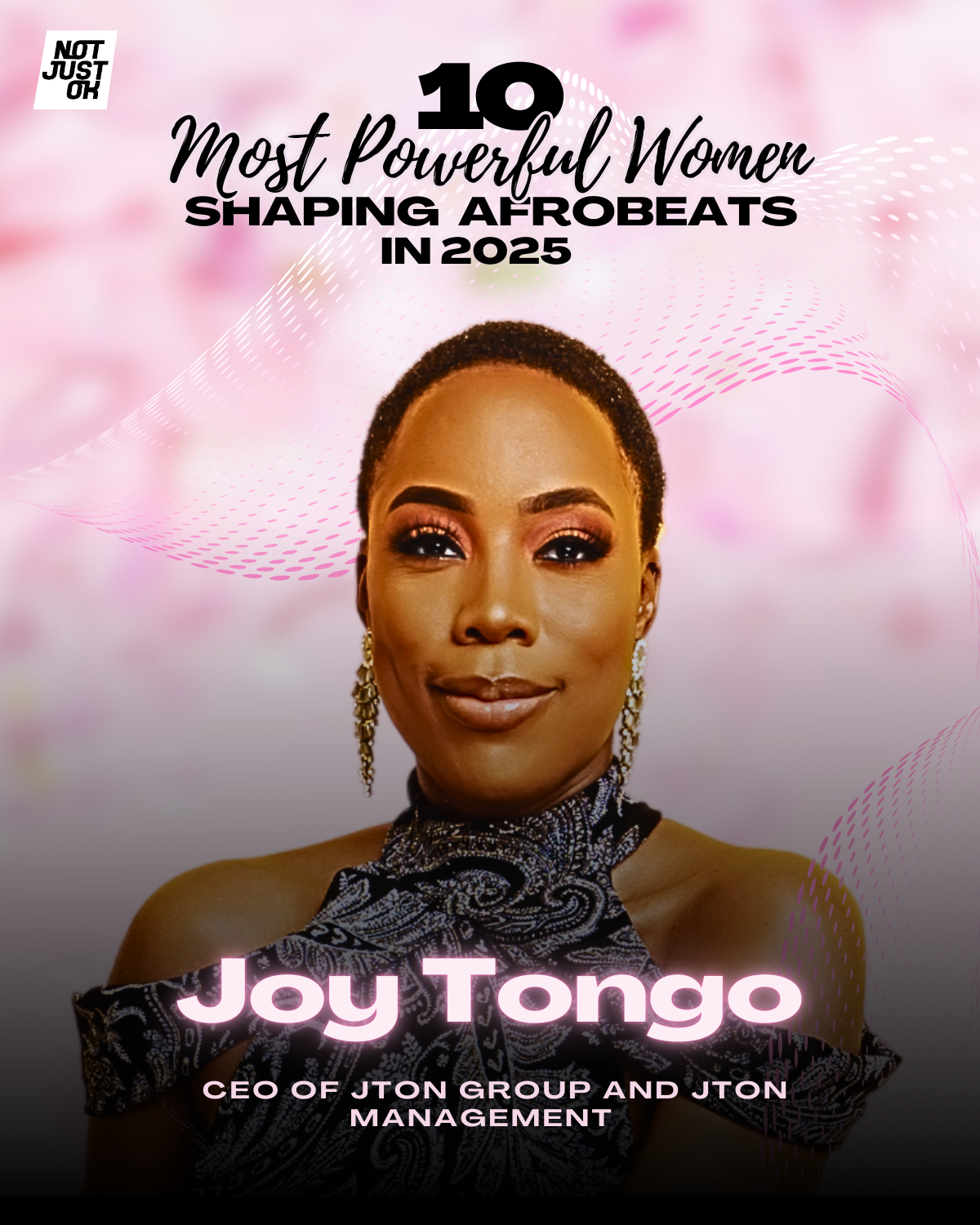
Joy Tongo is a Nigerian-American media entrepreneur and talent manager who serves as CEO of JtonGroup and JtonManagement. With over a decade of experience, she holds an MBA from Long Island University Brooklyn and has worked across the United States, the United Kingdom, and Canada.
Tongo began her career as a casting director for the 2011 film Spotlight and later transitioned into talent management, representing artists like Qing Madi, a soulful Afrobeats singer signed in 2022. By 2025, Tongo has guided Qing Madi to international acclaim with hits like See Finish, securing her performances at festivals like Wireless (2023) and partnerships with brands like Spotify, where Qing Madi was named Africa’s EQUAL artist in March 2024.
Tongo’s strategic vision has established Jton Music as a hub for emerging talent, complemented by her work as a motivational speaker and branding expert, notably featured at Music Business Academy Africa events.
In an interview with NotJustOk, [she] described working with Qing Madi as an “incredible experience.”
She also acknowledged the sexism and misogynistic issues female artists face in the industry while highlighting her commitment to addressing their inequalities, starting with her artist, Qing Madi. In her words, “Female artists face unique challenges, from sexism and misogyny to lack of access to resources and opportunities. As a label, we're committed to doing our part to address these inequalities and provide a safe and supportive environment for Qing Madi to thrive.”
As far as mental health goes, she travels, attends church to deepen her faith in God, and surrounds herself with family and friends, in addition to continuously learning and seeking mentorship. “…exploring new places, which helps me clear my mind and gain new perspectives,” she added.
Bose Ogulu
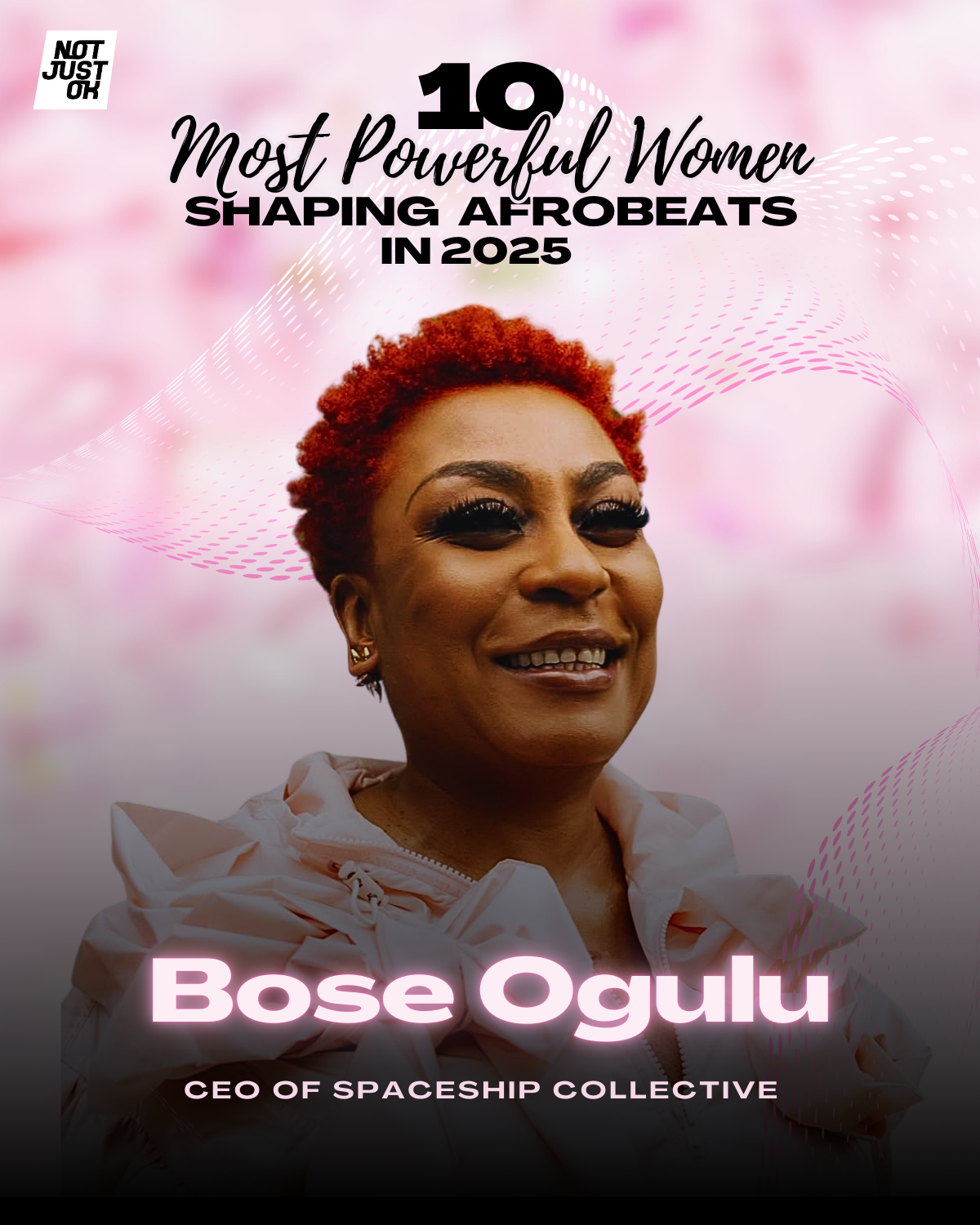
Bose Ogulu, known as "Mama Burna," is a Nigerian entertainment executive and the CEO of Spaceship Collective, encompassing Spaceship Records and its publishing arm.
Born to Benson Idonije (Fela Kuti’s former manager), she graduated with a Bachelor of Arts in foreign languages and a Master’s in translation from the University of Port Harcourt. Fluent in English, French, German, Italian, and Yoruba, Ogulu founded Language Bridges, trained over 1,800 youths in cultural immersion, and worked as a translator for the Federation of West African Chambers of Commerce.
After retiring as a French lecturer in 2018, she assumed full-time management of her son, Burna Boy. By 2025, her stewardship has delivered Burna Boy a Grammy for Twice as Tall (2021), a historic Coachella headline (2019), and sold-out tours at venues like Madison Square Garden (2022).
Ogulu’s influence extends to nurturing new Spaceship artists like Buju (BNXN), earning her Billboard’s 2021 International Power Players recognition.
Kimani Moore
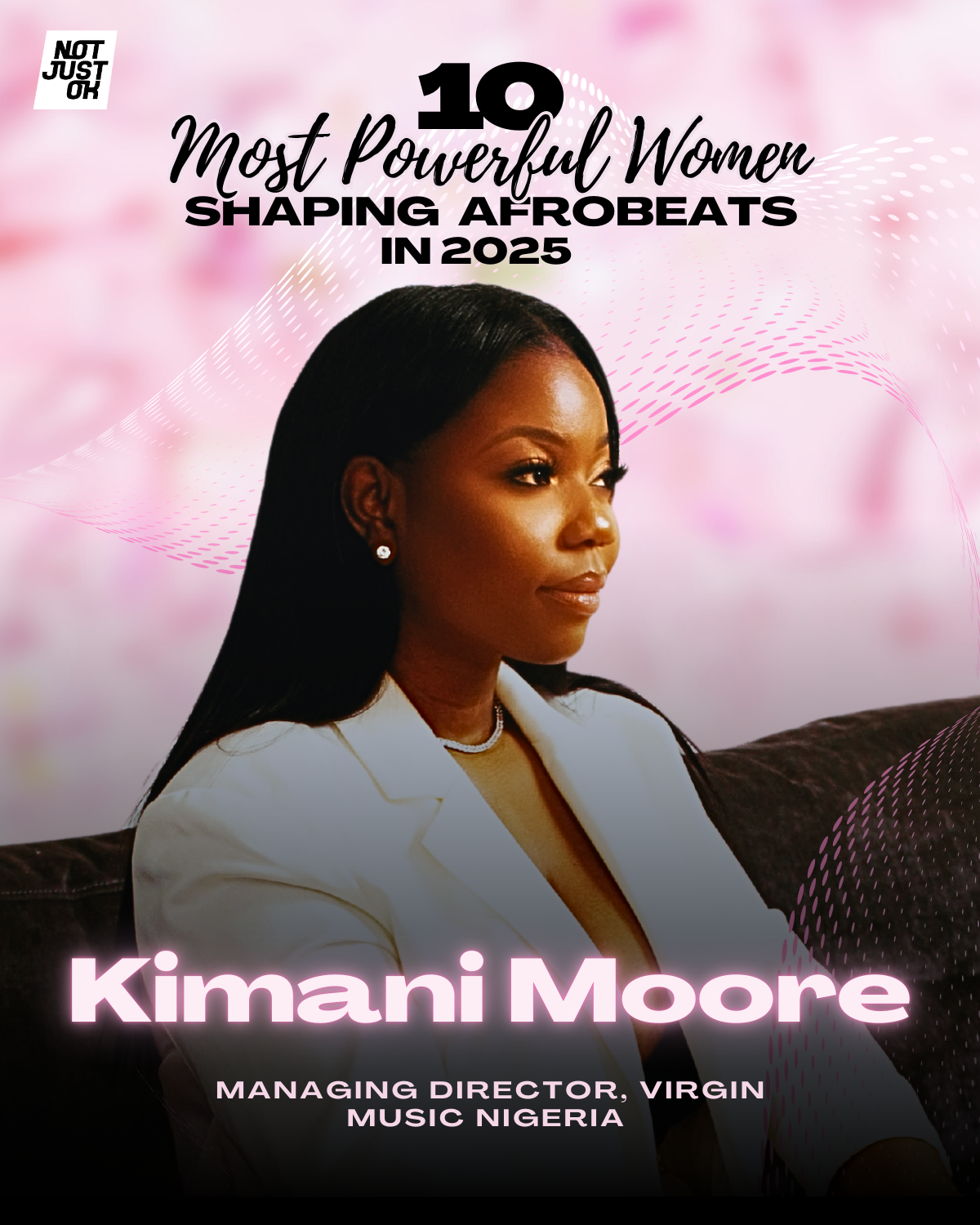
Kimani Moore is the Managing Director for Sub-Saharan Africa at Virgin Music Nigeria, a Universal Music Group subsidiary. Based in Lagos, she oversees operations to amplify Afrobeats’ global reach.
Moore founded Kimani Moore Entertainment, managing alternative artists like Odunsi (The Engine) and Santi, and previously served as Director of A&R EMEA at Warner Music Group.
Her leadership has strengthened Virgin Music Nigeria's efforts, notably leading Nigeria's market share in 2024 through partnerships with Dvpper and spearheading the strategic partnership with Ghana-based distribution and label services company Rain Labs in February 2025
Reacting to her quick impact, having dominated the Nigerian music industry from Q1 to Q3 in 2024 with Virgin Music Nigeria, Kimani said, “Success in this space isn’t magic—it’s a mix of strategy, culture, and good old-fashioned hard work. At Virgin Music Nigeria, we came in with a clear mission: to elevate African artists on a global stage while ensuring they have fair, sustainable careers. Our agility as an independent-leaning company, our commitment to artist-first deals, and our ability to move at the speed of culture have set us apart.”
“Also it helps that my team is actually just fantastic! Incredibly skilled, professional and very passionate. I think the team usually is the key to success in most cases,” she added.
“That said, let’s be honest—Afrobeats itself is a force of nature. The demand is there, the talent is endless, and our job is simply to amplify the magic that artists and their fantastic teams are already creating,” she continued.
Kimani identified lack of infrastructure as the greatest challenge facing the genre, highlighting continued investment, proper industry education, and a shift toward long-term thinking as solutions.
Lastly, when asked where she sees Afrobeats in 10 years’ time, she said, “Afrobeats will continue to evolve. Just like Hip-Hop, it will branch into subgenres, fuse with other sounds, and spawn new waves of artists redefining what African music looks like on the world stage. One thing is certain—Afrobeats isn’t slowing down anytime soon, but it is evolving. We just need to own it.”
Phiona Okumu
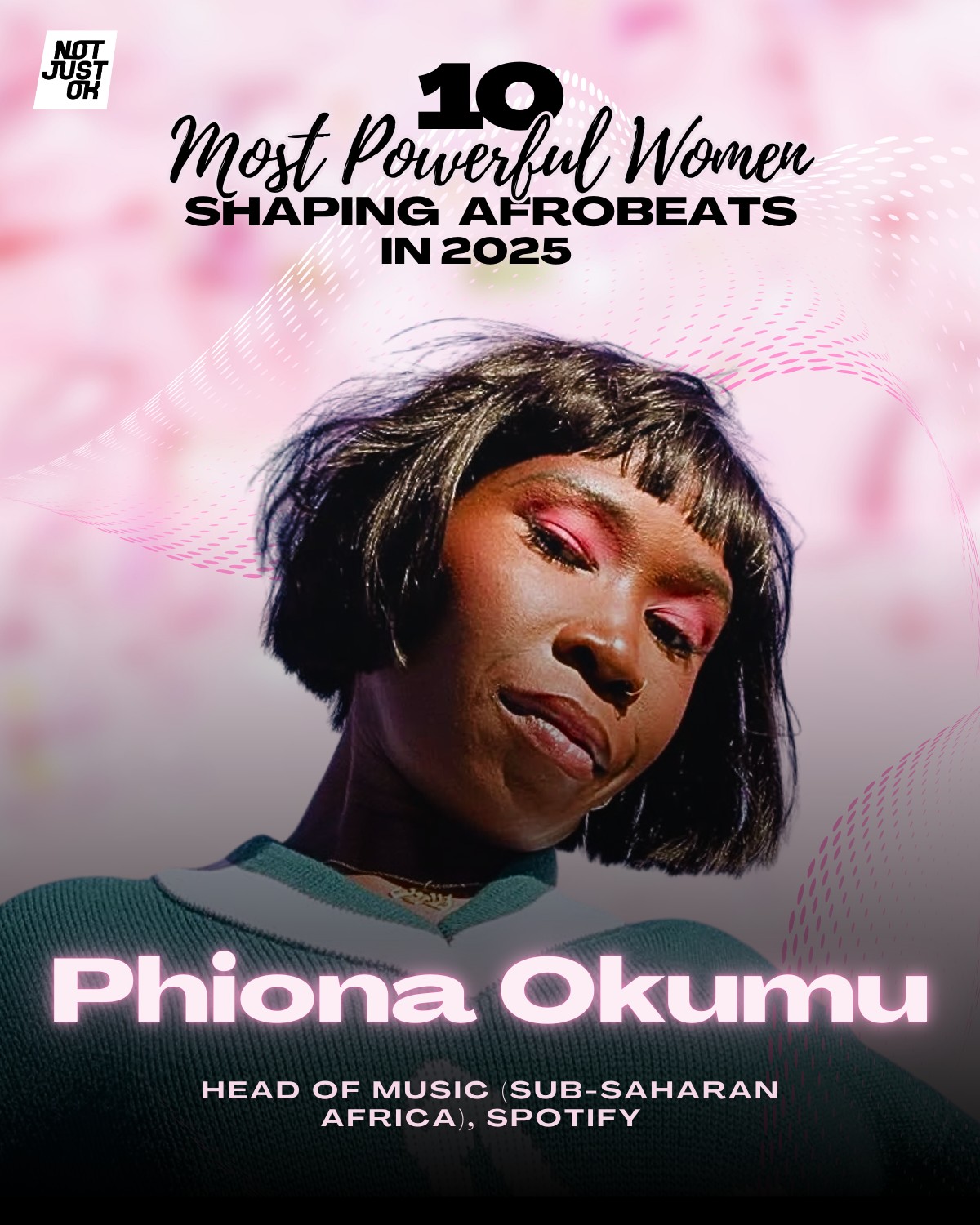
Phiona Okumu is the head of music (Sub-Saharan Africa) at Spotify, leading curation for African music by 2025. With a background in music journalism and event planning, she has shaped playlists like "African Heat" and "Afrobeats Hits," each exceeding 5 million followers (Spotify Wrapped 2023).
Okumu joined Spotify in 2018, rising through roles in artist partnerships and editorial curation. By 2025, her work has spotlighted artists like Tems (whose Free Mind hit No. 1 on Billboard’s R&B/Hip-Hop Airplay in 2022) and Joeboy, while integrating subgenres like Amapiano via playlists like "Amapiano Grooves."
Her data-driven curation, detailed in Spotify’s 2024 Loud & Clear report, has made the platform a cornerstone for Afrobeats’ digital growth, with Sub-Saharan streams up 114% in 2024.
Elizabeth Sobowale
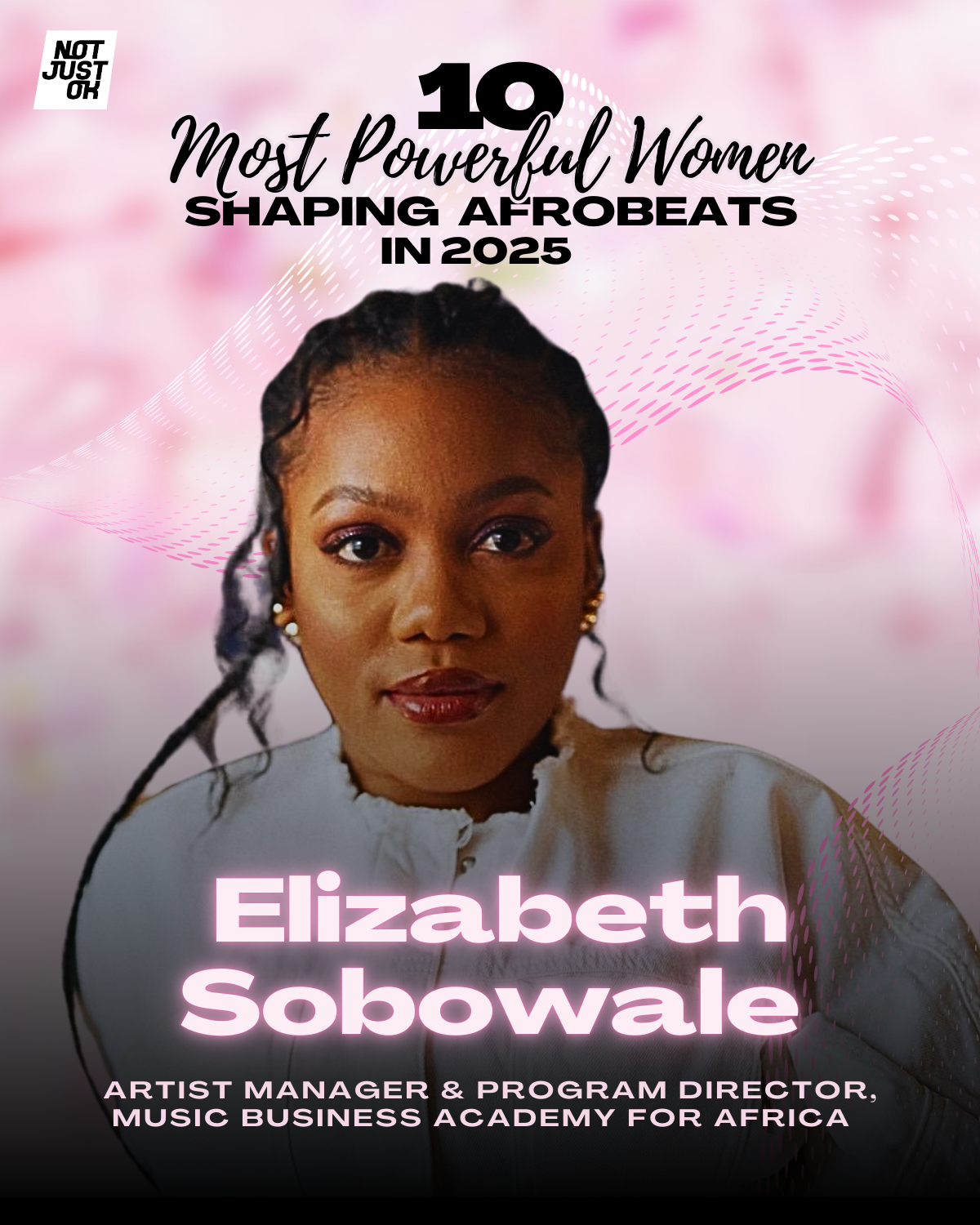
Elizabeth Sobowale is an artist manager and creative entrepreneur with over 10 years of experience as a music industry executive. She manages Adekunle Gold, driving his global success by blending Afrobeats with soul and pop. Named one of Nigeria’s top 30 music executives in 2022, she also serves as Program Director for the Music Business Academy for Africa, developing African talent within and beyond the continent. Her expertise spans brand development, marketing, tour management, public relations, creative direction, and promotions.
In 2025, Sobowale’s influence in Afrobeats is amplified by her Master’s Degree in African Studies from the School of Oriental and African Studies. She advocates for education, training, policy, and funding to grow Africa’s creative industries, aiming to boost socio-economic development and reduce youth unemployment. Her work with Adekunle Gold and her leadership in music education make her a key figure in the genre’s evolution.
Elizabeth Sobowale has managed Adekunle Gold, overseeing albums like About 30 (2018) and Catch Me If You Can (2022). By 2025, her efforts have secured Gold’s O2 Brixton performance in 2022 and facilitated collaborations with Rick Ross and Khalid.
Her operational precision ensures creative and commercial success, making her a vital figure in Afrobeats’ business landscape.
In a chat with NotJustOk, Elizabeth identified streaming access, strategic collaborations, major live performances, and stronger industry structures as the major factors behind Afrobeats’ success in the international music space.
“To sustain this growth, or more importantly for the home market to benefit from this growth, we must invest in education and industry development—training managers, A&Rs, and legal experts while building better infrastructure for touring, recording, and distribution. Long-term success depends on strategic planning and stronger business foundations,” she said.
On what the industry can do to ensure global record deals remain artist-friendly and beneficial for long-term growth, she said the industry must prioritize education, legal expertise, and ownership. “Artists and their teams need proper contract knowledge to negotiate fair terms, retain rights, and secure better revenue splits, and this is a two-way system,” she added.
Rima Tahini
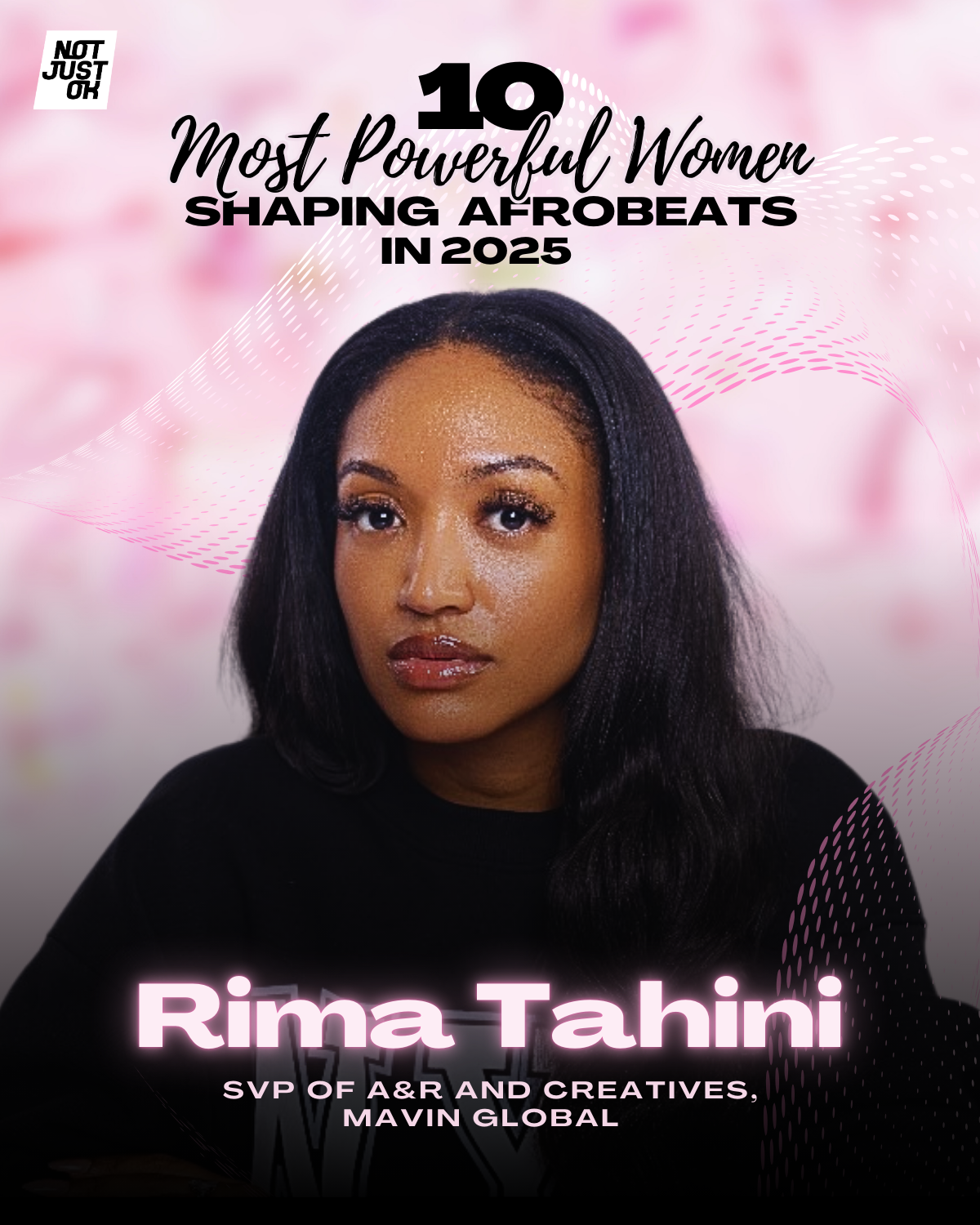
Rima Tahini is the Senior Vice President, Artiste and Repertoire (A&R) and Creatives at Mavin Global, one of the biggest indigenous record labels in Africa, founded by Don Jazzy. She is also a Senior Adviser at Kupanda Capital. Rima was born in Sierra Leone to a Lebanese father and a Sierra Leonean mother. Due to the ten-year-long civil war that broke out in Sierra Leone the year she was born, her family became refugees and had to move around a lot; Rima grew up in multiple cities and countries, speaking four languages by the age of seven. She has had a unique career trajectory, from energy and finance to now developing musical talents.
Rima graduated from the African Leadership Academy in 2012, winning the Allan Gray Gold Prize for Excellence in Entrepreneurship. She also graduated with a degree in Business/Economics with highest honors (Summa Cum Laude) from Brandeis University in 2016. Before graduating from university, she worked within the energy space at Tata Africa Holdings, Endeavor Energy Holdings, and Symbion Power in Johannesburg, Accra, and Lagos, respectively. After graduating from Brandeis, Rima joined Kupanda Capital in 2016 and played a key role in building and actualizing the Mavin and Kupanda deal/partnership.
Today, Rima is a member of the Recording Academy Class of 2022 and now works closely with some of Africa’s most recognized names in music. Through her role as Senior Vice President of A&R and Creatives at Mavin Records, she has played a key part in the development and branding of superstars such as Rema and Ayra Starr, launching over six artists in the music industry in the last four years.
In an interview with NotJustOk, we talked about how she finds balance between work and family, gender imbalance with the Afrobeats ecosystem, the conversation around Afrobeats loosing it's originilaty.
On finding a balance between leading the A/R team at Mavin Records, being married and motherhood, she said, “Balancing all of these roles is no easy feat, but it’s all about prioritization, communication, and a strong support system. You can have it all, but not all at once. I’m incredibly lucky to have a partner who understands my passion and drive, so we are able to support each other both professionally and personally. In my role as head of A&R, my job is always evolving, but I make sure to be present for my daughter, even if that means adjusting my schedule or being intentional about carving out family time. Every day is a mix of learning, managing, and adapting, and having a clear sense of purpose keeps me focused.”
When asked the reasons behind the gender imbalance, she said, “Societal and cultural biases make it so that they have to be nothing short of perfect all the time, from every hair strand to how they look, dress, talk, act and sound. Our culture is not very forgiving of female artists. Lastly, there are still not enough females on the backend to build female artists in the first place, and that’s very needed. I personally love developing female artists, they can be really exciting, so much to work with, and when it works, it’s insane how many revenue verticals you can build around.”
On the potential loss of Afrobeats’ essence to foreign investors, Rima said, “Fusion is natural—music evolves, and artists experiment to remain relevant.”
In her words, “The goal is to expand, not dilute. Afrobeats, at its core, is part of our identity as West Africans and now as Africans I’d say, and we can’t lose sight of that amidst the global appeal. Fusion is natural—music evolves, and artists experiment to remain relevant, but it's crucial that the soul of Afrobeats remains intact. The unique rhythm, instrumentation, and storytelling are what make it stand out, and I believe those elements should be protected. To preserve its essence, I think the industry should focus on fostering more homegrown talent and encouraging them to experiment without diluting their roots. Labels, producers, and A&R teams must continue to champion authenticity while pushing boundaries. Showcasing the diversity of African sounds and cultures is also key in maintaining the genre’s integrity while still allowing it uto evolve and thrive globally.”
Jada Pollock
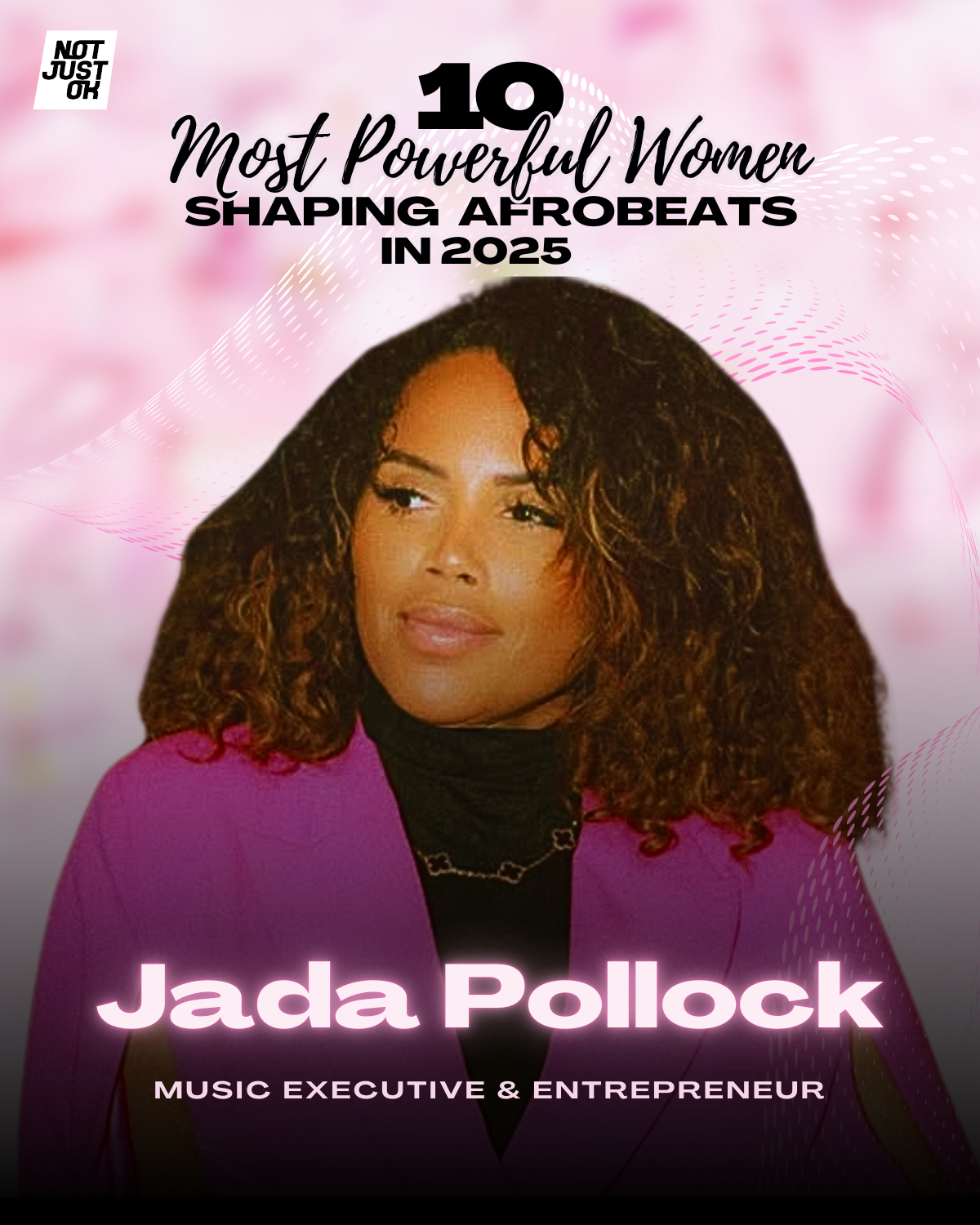
Jada Pollock is a music executive and entrepreneur renowned for her work in the Afrobeats industry, particularly as Wizkid’s manager. She earned a journalism degree from the University of Westminster in London and launched her career as a stylist for Gucci, later collaborating with artists like Chris Brown before transitioning to Afrobeats. Pollock first connected with Wizkid professionally around 2012 during his concert in Lagos, and by 2018, she was widely recognized as his manager, leveraging her industry experience to elevate his global profile.
Pollock has been instrumental in several of Wizkid’s career milestones. She managed the release of Made in Lagos (2020), which earned Grammy nominations for Best Global Music Album and Best Global Music Performance in 2022, introducing innovations like the "Day in the Live" YouTube livestream, as noted in her Billboard Executive of the Week feature in September 2021. She also oversaw his sold-out Madison Square Garden performance in 2022 during the More Love, Less Ego tour and likely supported his 2019 collaboration with Beyoncé on Brown Skin Girl, part of The Lion King: The Gift soundtrack, which won a Grammy for Best Music Video in 2021.
As CEO of her management firm, Pollock secured a Puma ambassadorship for Wizkid in September 2020, launching a Starboy-inspired collection tied to Made in Lagos. She guided Morayo (2024) to critical acclaim and a record-breaking Spotify debut as the biggest by an African album, reinforcing her strategic vision. Through branding and international expansion, Pollock has solidified Wizkid’s status as a leading Afrobeats figure, contributing to the genre’s global rise alongside artists like Burna Boy and Davido, building on his earlier successes like One Dance with Drake (2016), which predates her confirmed management role.
Temi Adeniji
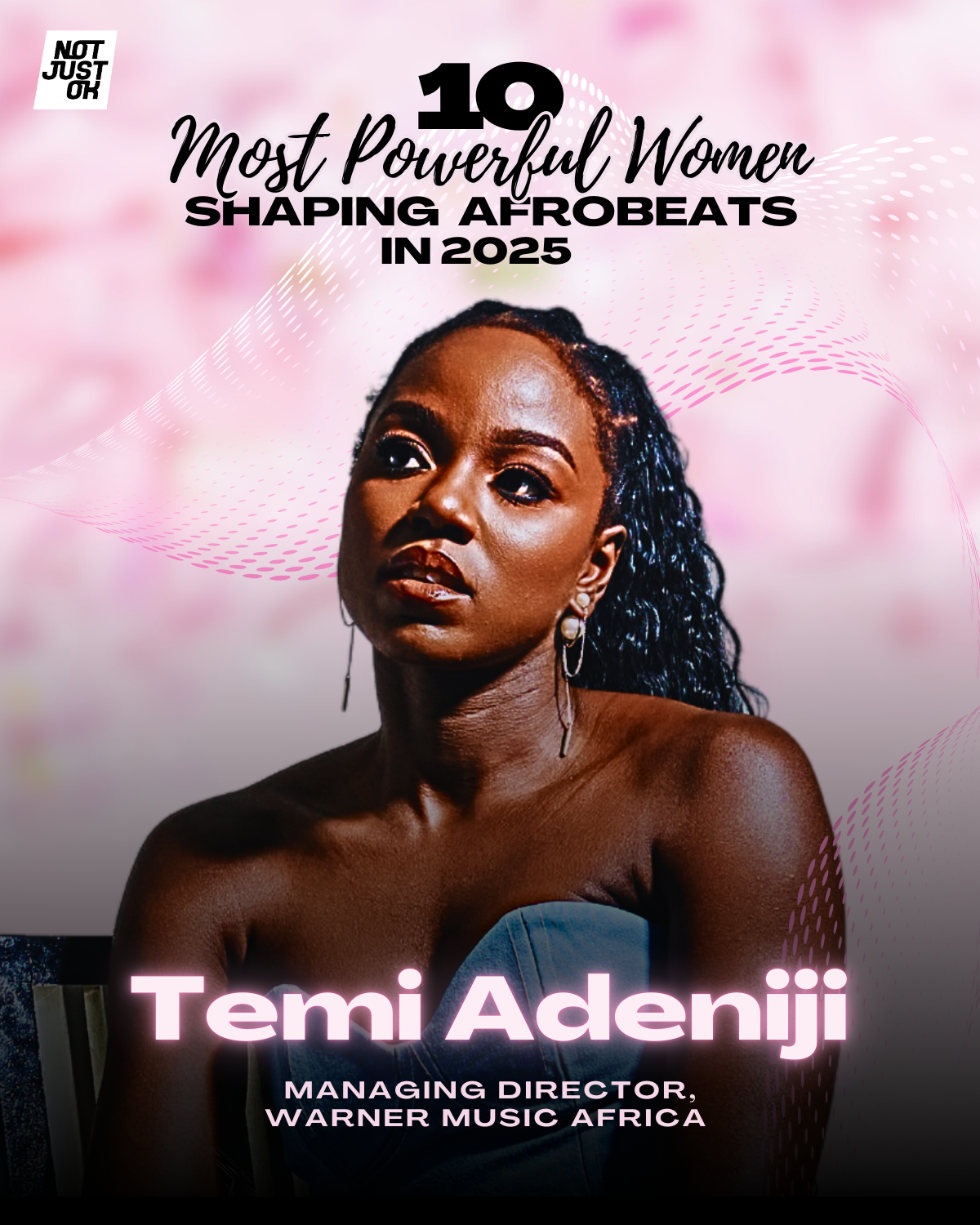
Temi Adeniji is the Managing Director of Warner Music Africa and Senior Vice President of Special Projects at Warner Music Group.
A Nigerian-American with degrees from Princeton (2009), Columbia Law School (JD, 2012), and University College London (LLM, 2012), she joined Warner in 2016 and relocated to Johannesburg in 2021.
By 2025, Adeniji has led Warner’s partnership with Chocolate City, driving CKay’s Love Nwantiti (2019) to over 1 billion streams, and signed acts like Joeboy, Flavour and Kold AF. She played a critical role in Warner Music’s acquisition of Africori (2022) and bolstered distribution, earning her spots on Billboard’s Women in Music (2023) and International Power Players (2024) lists.
In an interview with NotJustOk, Temi revealed the secret behind her ability to build and maintain relationships, ensuring the artists/labels on her roster are satisfied despite potential competition between them. In her words, “I started my career as a lawyer in a big law firm in New York City, representing banks, private equity sponsors and the like. The number one rule ingrained in me from that chapter is the importance of responsiveness. Any query by the client was meant to be addressed ASAP.”
“Fortunately, this commitment to responsiveness has persisted. In my current role, my artists are my clients, and as such, my most significant offering is my responsiveness. I always tell artists / their teams, I may not be able to solve all your problems but you’ll always have an answer (whether it’s what you want to hear or not) from me. I have the guts to deliver bad news and good news with the same resolve. This approach allows me to develop trust with artists / their teams on a 1-to-1 basis in a manner that proved to them that they are a priority,” she added.
When asked the one thing a young Temi would be proud she has accomplished, she said, “My authenticity.”
“I am who I am, and I don’t compromise my identity for anyone or anything. Having the courage to be myself in ways that are not necessarily aligned with traditional advice given to women in leadership positions is not always easy, but it’s the most important thing because it means I can always recognize myself,” she continued.
“Women are often told to dress a certain way or not to be “too fun” because they won’t be taken seriously as leaders. I don’t buy into that at all and though not everyone can handle my irreverence, it is at the core of my personality and it won’t be changing any time soon. If I want to dance or wear a bikini and that causes someone to think of me differently, the joke is actually on them because being underestimated is a gift. I go above and beyond in terms of my work, so I know my competence can never be questioned on the facts. I play by my own rules, and this means I don’t get tripped up by trying to follow an outdated template,” she added.
Praise Onyeagwalam (Director Pink)
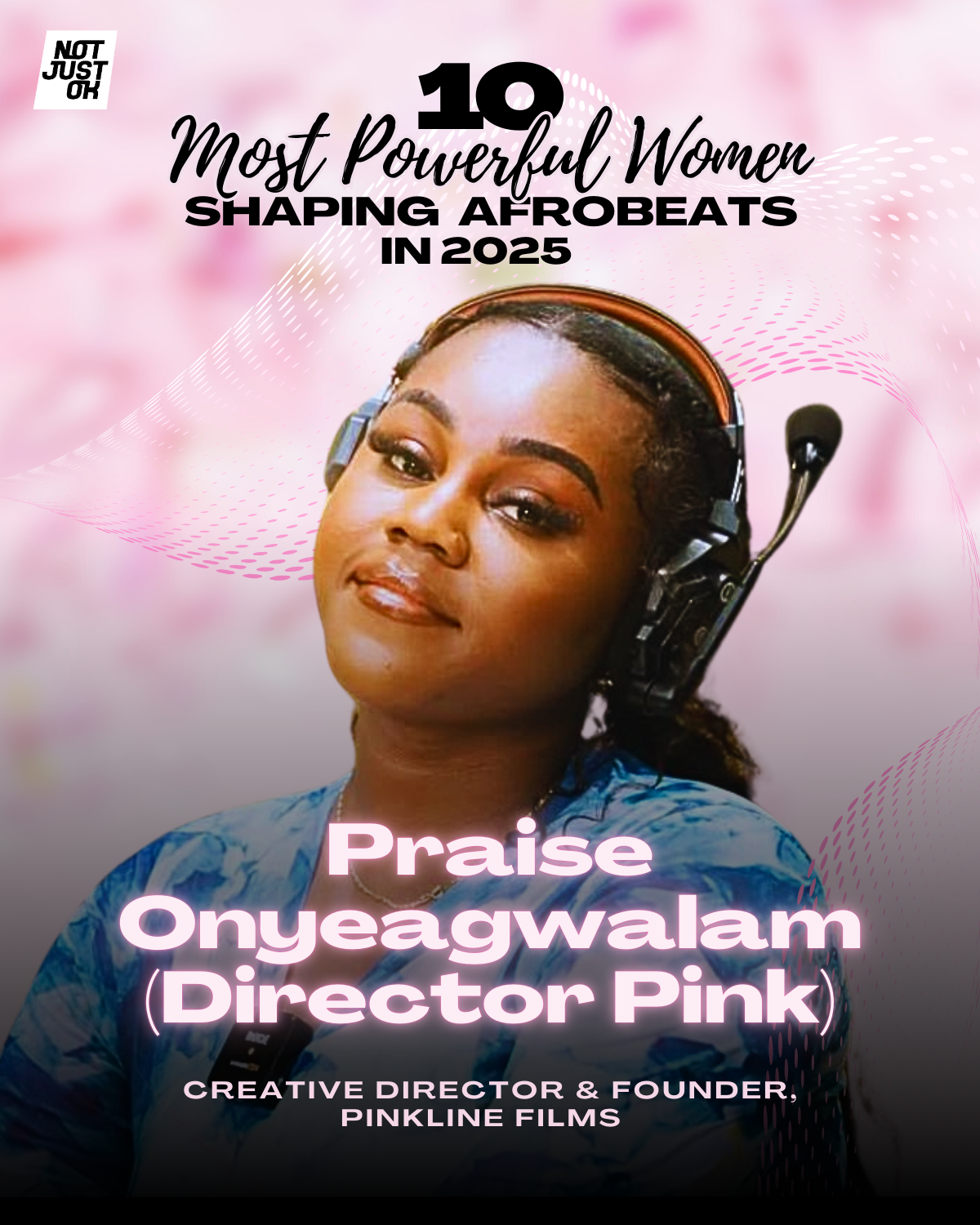
Praise Onyeagwalam dubbed the "Director Pink," is a Nigerian creative director and founder of Pinkline Films with a media production degree from the University of Lagos.
By 2025, her vibrant visuals for Chike's Running To You (2021), Rexxie’s Abracadabra (2023) and Chike's Egwu featuring Mohbad (2024) have defined Afrobeats’ aesthetic. She won AFRIMA’s Best Video Director award (2023) and has directed campaigns for Coca-Cola and MTN. Onyeagwalam’s mentorship of young directors via Pinkline workshops (started in 2022) underscores her influence on Afrobeats’ visual culture.
In an interview with NotJustOk, Director Pink said she discovered videography in church. “There was a lady shooting the church service, and I remember watching her work and feeling so inspired. It sparked something in me, and I decided to join the video team at my church. That was my first hands-on experience with cameras, and it opened my eyes to the world of visual storytelling,” she said.
“From there, I explored various aspects of film. I dabbled in graphic design, animation, and other creative fields, trying to find my space. But no matter what I explored, something kept pulling me back to filmmaking. There was just something about capturing moments, telling stories through visuals, and bringing ideas to life that felt like home. That’s when I knew this was what I was meant to do,” she continued.
When asked if she feels the responsibility of being a model for women in a male-dominated profession, she said, “Honestly, yes.”
She said it’s a beautiful but weighty responsibility to know that her work and presence in the industry can inspire other women, which directly and indirectly pushes her to keep raising the bar.
“The industry isn’t always the easiest to navigate, especially for women, but I want my journey to show that it’s possible to break through, own your space, and lead,” she said.
“That’s also why I started Pinkline Academy—a platform dedicated to training the next generation of filmmakers in Africa. It’s important for me to not just succeed as a director, but to also create opportunities for others, especially women, to step into this industry with confidence and the right skills,” she added.
On the importance of music videos to the gospel of Afrobeats to the world, Pink Director said, “Afrobeats is more than just music, it’s culture, movement, and identity. Music videos help amplify that by giving a visual narrative to the sound. They showcase our fashion, our dance, our streets, and our traditions in a way that resonates globally. Afrobeats is already breaking boundaries sonically, but the visuals push that reach even further, connecting people emotionally to the music. A strong video can turn a great song into a global anthem. That’s the power of visuals in Afrobeats storytelling.”
Osagie Osarenkhoe
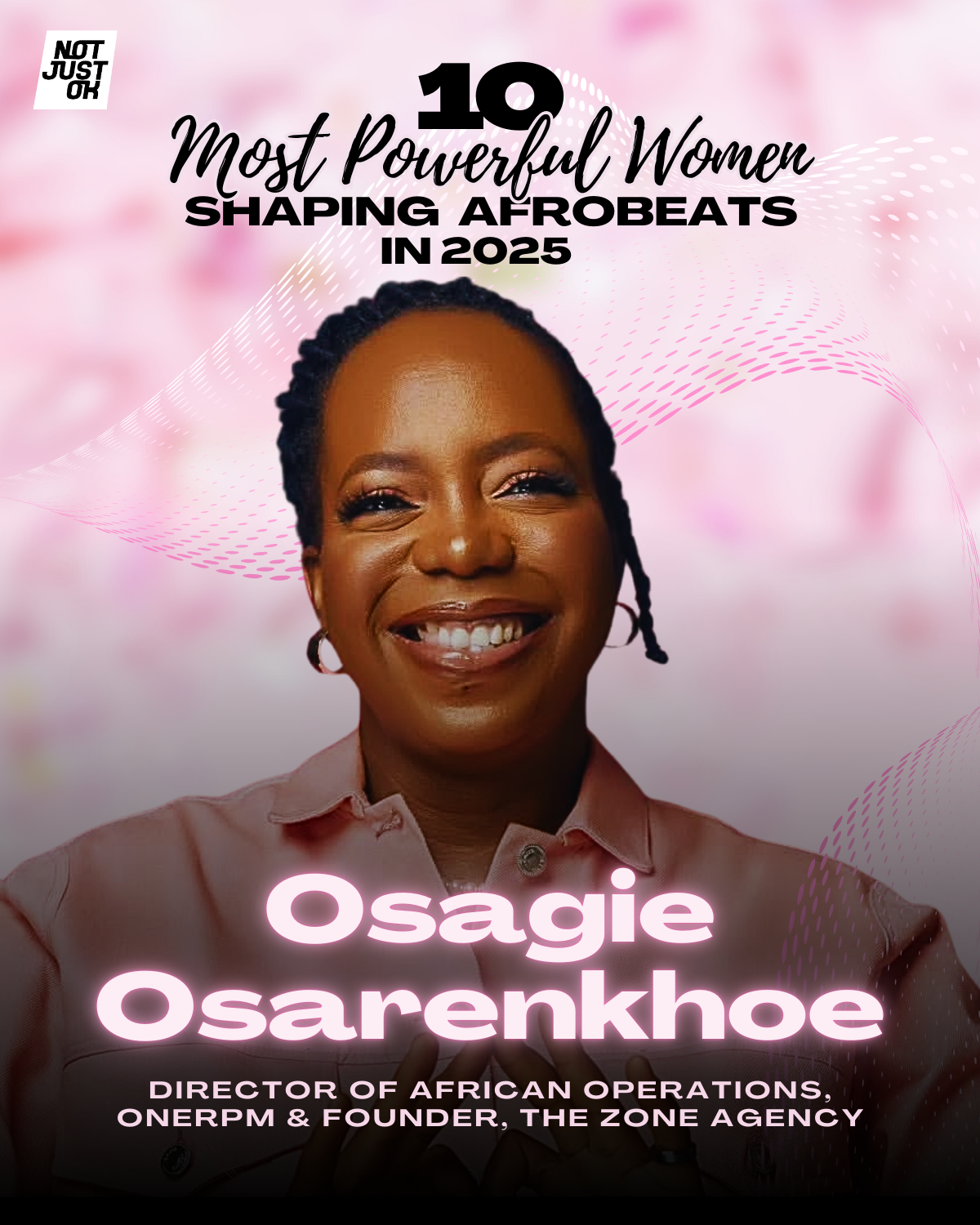
Osagie Osarenkhoe is a Nigerian talent manager and Director of African Operations at ONErpm since 2022, alongside founding The Zone Agency in 2016. With over 15 years of experience, she managed Wizkid (2011-2014), Skales, Shaydee, and Timaya, notably securing Wizkid’s early deal with EME. Starting at Cool FM and producing for Moments With Mo.
By 2025, Osarenkhoe has expanded ONErpm’s footprint into Ghana, Côte d’Ivoire, Kenya, Tanzania, and South Africa, offering distribution and label services. Overcoming a 2008 car accident that fractured her jaw, she remains a trailblazer in Afrobeats’ structural growth.
In our chat with Osagie Osarenkhoe, we talked about the secrets behind her longevity, managing artists’ egos, and the changes she’d love to see in the Afrobeats ecosystem.
For her longevity, she attributed all glory to God.
“If there’s one thing I’ll always be grateful for, it’s His grace. I try not to let the noise get to me. When it does, I remember why I do what I do and get back at it. I love what I do. Working in music and evolving over the years has been a blessing, and I am thankful,” she said.
On managing artists’ egos, she said it is usual for artists to develop an ego with all the attention and affluence that comes with fame. However, what’s most important is how these egos are managed. In her words, “Managers, label reps, executives, and families play a role in helping artists learn how to manage these things and handle the pressures and hype of fame, but at the end of the day, a person’s true character always shows. I try to be as honest, strict and respectful as possible and as needed, and I always point it out when an artist steps out of line.”
On some changes that would benefit the Afrobeats ecosystem, she said, “I would like to see more local music showcases for emerging artists to hone their performance skills and stagecraft right from the start of their careers. I would like to see more female artists, managers, and music executives performing at the highest levels in the industry and succeeding at it.”
Conclusion
In 2025, Joy Tongo, Bose Ogulu, Kimani Moore, Phiona Okumi, Elizabeth Sobowale, Rima Tahini, Jada Pollock, Temi Adeniji, Praise Onyeagwalam, and Osagie Osarenkhoe are the architects of Afrobeats’ global triumph. Their leadership spans management, digital curation, marketing, and creative innovation, blending cultural roots with commercial prowess. As Afrobeats dominates charts and stages worldwide, these women’s contributions ensure its enduring impact, paving the way for future generations.
Get Fresh updates from NotJustOk as they drop via X and Facebook

